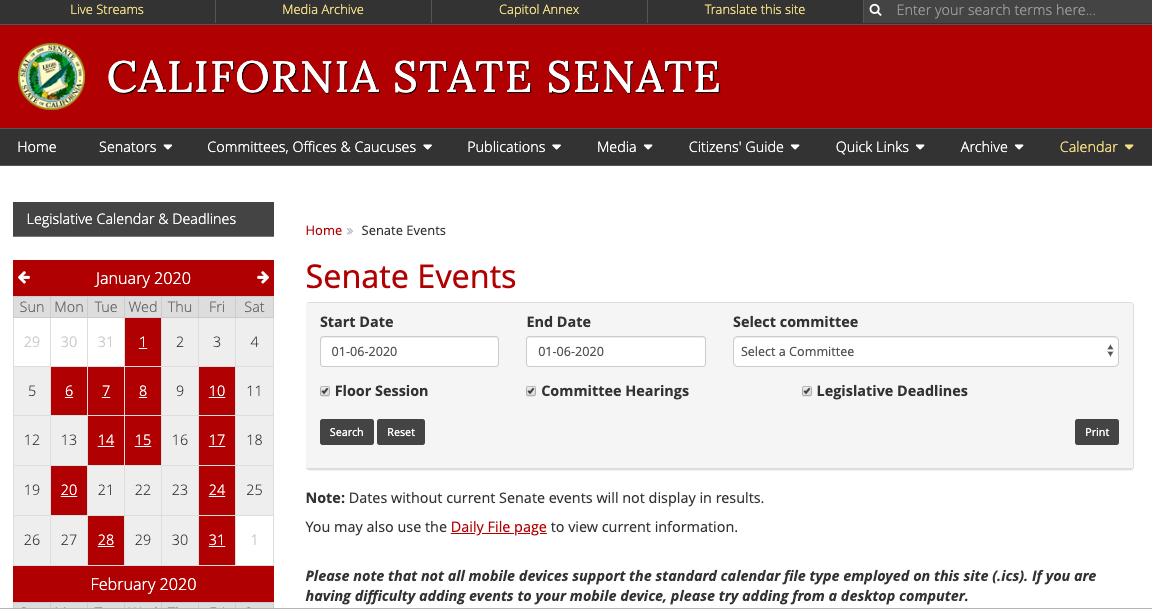
California Assembly Chambers. (Photo: Kevin Sanders for California Globe)
Picking the Right Bill Author to Be Your Legislative Champion
Sponsors or interest groups ask an author to carry their proposal
By Chris Micheli, January 5, 2020 9:07 am
It is often a time-consuming and sometimes daunting task to find just the right author for a bill to introduce in the California Legislature. How do some lobbyists pick the right bill author? While there is no cookie-cutter approach to doing so, there are some questions to help guide you through the process to choose a good author for your proposed legislation.
Non-Controversial Bills
Many bills are “run of the mill” measures (i.e., they are relatively straight forward and not controversial) and, as a result, picking the right author is less critical to the bill’s likely success in the legislative process. In some instances, however, a bill author can make or break a bill’s travels through the legislative process and ultimate action by the Governor. Some bills do not require much work by the author because of the non-controversial nature of the measure. Others, however, will require tremendous time and commitment by the bill’s author. So, picking the right legislator becomes quite important for the more controversial bills.
Overview
Certainly many legislators and their staff choose measures that the legislator will author. However, in other instances, sponsors or interest groups ask an author to carry their proposal. So, what goes into picking a bill author? There are a number of factors to consider. For example, if the bill deals with an issue in a particular legislative district, then it is appropriate to have as the bill’s author the legislator representing that district. If the bill is a significant policy issue, then there is always a strong desire to have the policy committee chair (or a member of that policy committee) author the particular measure.
In addition to those practical ones, an important consideration for many lobbyists is a preference for legislators who will understand and personally advocate for their bill. For example, a legislator who practiced as a CPA would be of benefit to a complicated tax law change bill. Or, a legislator who previously served on a local transportation district’s board might be a solid author for a transportation funding measure. A bill author who is recognized by his or her colleagues as an expert in the subject matter of your bill is naturally very helpful to the bill’s chances of success.
Moreover, an author who works diligently in support of his or her bill is an important quality in having a successful bill. With more controversial bills that pit major interest groups against each other, it is important for a legislator to be willing and able to advocate for the bill with his or her legislative colleagues. There is no better lobbyist than the bill’s author with his or her fellow legislators. The legislator may also be called upon to help negotiate amendments to resolve a powerful interest group’s opposition. And they may speak to the media about the bill and its purpose. Of course, a good author is often apparent when he or she is presenting the bill in committee or on the floor.
House of Origin
Which house do you want to start the bill? What are the pros and cons of the Assembly versus the Senate? Do you want to build momentum for your bill and start in the easier house? Or start in the more difficult house to get over the main hurdle(s)? What are the fiscal impacts of the bill? The following is a list of other considerations in choosing a bill author:
District Bills
If the sponsor of the bill is located in a particular legislator’s district, or the subject matter of the bill relates to a particular legislator’s district, then it is appropriate to first seek that legislator to be your bill author. This approach is generally viewed as a matter of legislative courtesy and a legislator in this position will expect to be asked to author the bill. An additional issue here will be whether to have the Assembly Member or the Senator author the bill.
Policy Expertise
In dealing with a substantive policy issue in a bill, an obvious approach is to select as an author a member of the policy committee through which the bill will travel. Even better, can you get one of the policy committee chairs to author the bill? If not, will one of the committee members author the bill? Often fellow committee members are more open to supporting a bill by one of their colleagues who sits on the same committee. And, besides, at least that way your bill is guaranteed at least one aye vote in committee!
Leadership
Naturally, members of the Assembly or Senate leadership often make good bill authors but, for obvious reasons, they are usually selective in the bills they choose to author. And, as appealing as having the Appropriations Committee Chair author a bill, they are even more particular about which bills they agree to author. Even they usually hold a bill or two of theirs on the “Suspense File” in an effort to diffuse their colleagues from being too upset because their colleagues usually do not get all of their bills off the Suspense File either.
Minority Party Members
In many instances, minority party members make excellent bill authors, especially those who enjoy good working relationships with their majority party colleagues. These legislators often have particular policy area expertise or they represent a legislative district that is affected by the legislation.
Work Ethic
Ultimately, a lot of success is achieved by hard work and knowledge about the bill. A bill author who is committed and knowledgeable about his or her bill is better as an author than a legislator who is the opposite because his or her colleagues will readily recognize that the bill is not important to that legislator.
No “Sponsored” Bills
Interest groups should also be aware that there are usually several legislators each term who do not author “sponsored bills.” These legislators only want bills from their staff, constituents or themselves. This can present some issues in selecting a bill author, especially if it is a bill that this legislator should carry due to their policy expertise or because they represent a particular legislative district.
Questions for Consideration
Although any sponsor would like to get its ideal author, that may not always be possible. Here are some of the key questions to pose in looking for your best bill author:
- Is the author in a leadership position? Does the bill need to be authored by a legislative leader?
- Do you need the leader of the geographic delegation to carry the bill? For example, having the chair of the LA delegation carry a bill to benefit Los Angeles County could be helpful.
- Do you want an ethnic group of legislators to support the bill? Would the chair of the Latino Caucus, for example, help your bill’s chances of success?
- Do you need an author with strong ties to the Governor?
- Is the legislator a recognized leader in the subject matter of your bill so that he or she would expect to carry the bill?
- Does a particular legislator have a strong interest in the specific bill or the general policy area?
- Has this legislator authored a similar bill in the past?
- Does the legislator have particularly strong personal or committee staff to help the bill’s chances of getting through the legislative process?
- Will your author be an effective advocate for the bill? Will he or she do well in presenting the bill? Is he or she well-liked by his or her colleagues?
- How committed is the author to the bill? Will he or she actively lobby his or her colleagues in favor of the bill?
- Does the legislator have a good relationship with either supporters or opponents of the bill that could impact the bill’s passage in the Legislature? In other words, will this legislator be able to negotiate with the opposition to secure their neutrality?
- Will you work well with the author and his or her staff?
There are certainly other questions and other factors that may go into determining who is likely your best bill author. But the questions posed above should provide a good avenue to get started in the process.
- Deposit of Unclaimed Property in California - February 8, 2026
- Is There a Funding Requirement for Prop. 36? - February 7, 2026
- Definitions for Enforcement of Judgments - February 7, 2026




Thanks for mentioning that you need to pick which house to start the bill, the pros, and cons of Assembly versus the Senate, and building momentum for the bill. My sister is thinking about sending a request to sponsor legislation for horse protection advocacy because she speculates that American horses need the protection of the government. I think it’s a good investment to request sponsorship from reputable people that can help pass bills if she decides to take action.